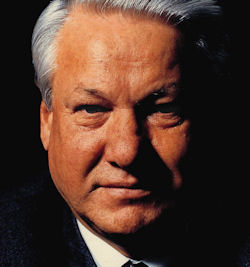Exit Yeltsin
 Yeltsin was not able to take advantage of his renewed mandate. Having suffered a heart attack during the last weeks of the campaign, he spent the rest of the year on the sidelines. The lack of vigorous leadership contributed to an atmosphere of political and economic uncertainty which persisted until early 1997.
Yeltsin was not able to take advantage of his renewed mandate. Having suffered a heart attack during the last weeks of the campaign, he spent the rest of the year on the sidelines. The lack of vigorous leadership contributed to an atmosphere of political and economic uncertainty which persisted until early 1997.
Yeltsin was much criticized in 1994 and 1999 for his erratic behavior and ineffective leadership in the first and second war with the Republic of Chechnya. He sent ground troops into Chechnya in 1994 and again on September 30, 1999. He was also criticized for presiding over the economic decline of Russia as many Russian companies were transferred to private ownership. Despite a professed commitment to market reform, the Yeltsin government in fact merely redistributed the Soviet economy among a privileged few. The new Russian State organized around Yeltsin became primarily an enabling mechanism for the appropriation of public assets by the old and new elites.
After a year of mysterious health problems, winning the presidential elections, and then undergoing heart surgery, President Yeltsin disappeared from the public eye. This was after a shaky midnight appearance on national television to wish his countrymen a happy new year. Still recovering from his heart surgery, Yeltsin and his health were a constant question in the Russian press. On 08 January 1997, it was announced that the president had entered the hospital, and was recovering from double pneumonia.
The August 1998 collapse of the ruble and Russia’s financial markets provided a traumatic corrective to the Russian economy.
After weeks of speculation that Prime Minister Yevgenii Primakov would soon be dismissed, Russian President Boris Yeltsin announced on 12 May 1999 that he had accepted Primakov's resignation. Yeltsin explained the need for Primakov's departure by citing the fact that "the economy of Russia has not improved...." By 09 August 1999, Yeltsin had decided that "the person who is able to consolidate society and, drawing support from the broadest political forces, ensure the continuation of reforms in Russia" is Vladimir Putin. Putin was director of the Federal Security Service.
On December 31, 1999, Yeltsin signed a decree announcing that he was stepping down from his post as president and was succeeded by Vladimir Putin. Yeltsin's leadership was corrupt, and feared a settling of accounts after he left office. Putin, the head of the secret service with little political experience, became Yeltsin's successor with a pledge that Yeltsin and his family would be safe from prosecution.
The simplicity of Yeltsin, his openness, his ability to make broad gestures, often melted the ice in relations with other politicians. But his emotionality was skillfully used. Under the influence of the refinement of reception and the friendly disposition of the hosts, Yeltsin could relax and make concessions unexpectedly for his advisors, who had to disentangle the consequences of the "initiatives" of the chief.
His salary in terms of dollars was from five hundred to a thousand dollars a month, depending on the exchange rate. He had no shares, no bills of exchange, no accounts with foreign banks. Every Friday President Yeltsin gave his wife an envelope with his salary - just like he did in Sverdlovsk, and she returned him a certain amount for expenses. He still liked simple Russian food. Unlike Gorbachev, who cursed like a shoemaker, Yeltsin never swore and forbade others to express themselves. Yeltsin did not have flashes of rage, he almost never raised his voice. Unlike Gorbachev, he addressed everyone by name and patronymic and always with "you."
Boris Yeltsin died on April 23, 2007 of a heart attack. The Russian political establishment buried Yeltsin in Novodevichy Cemetery with only the most muted and qualified praise. Secretary of State Condoleezza Rice said "As Russia's first democratically elected post-Soviet president, President Yeltsin will be remembered for his significant contribution to ending the Cold War and his efforts to expand political and economic freedom at home and abroad. He ushered in a new era for his country in which ordinary Russians were able to speak and worship without fear, to own property, and to choose their leaders freely. In doing so, he inspired a generation of young Russians to build a bright new future for their country and to choose peaceful relations with their new neighbors. President Yeltsin will also be remembered fondly by the American people for establishing good relations between our nations after many years of conflict."
|
NEWSLETTER
|
| Join the GlobalSecurity.org mailing list |
|
|
|

